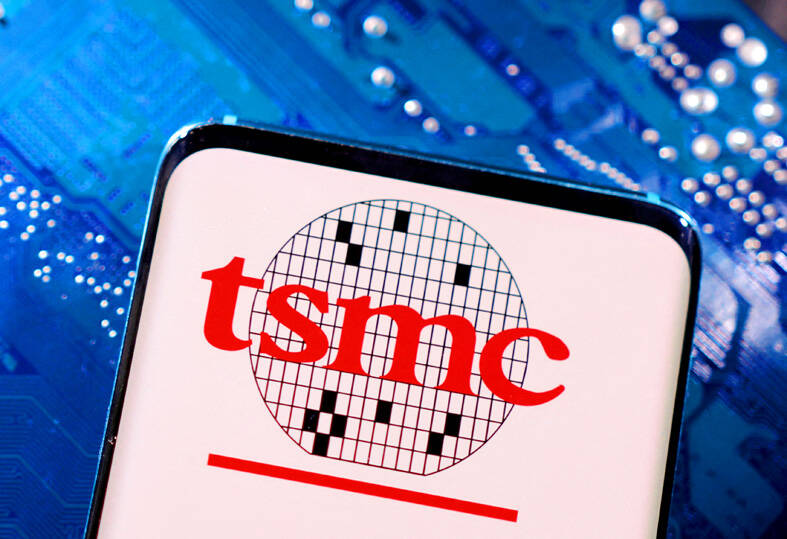Taiwan Semiconductor Manufacturing Co (TSMC, 台積電) remained the top invention patent applicant in Taiwan in the first quarter of this year, outpacing all local and foreign applicants, the Intellectual Property Office said on Thursday.
TSMC filed 752 invention patents, up 4 percent from a year earlier, marking the fourth consecutive year the chipmaker claimed the first place in the first quarter.
Patents are categorized into three groups in Taiwan: invention, design and utility model. Invention patents are considered the most important in terms of new technology ideas.

Photo: Reuters
Smartphone IC designer MediaTek Inc (聯發科) took second place among local applicants with 146 invention patent applications, up 121 percent from a year earlier, the highest rate of growth among local firms.
DRAM chip supplier Nanya Technology Corp (南亞科技) was third with 115 invention patent applications, up 17 percent from a year earlier, followed by flat-panel makers Innolux Corp (群創) and AUO Corp (友達), which filed 101 and 94 applications, up 3 percent and 7 percent respectively.
The office said it was the first time Innolux has filed more than 100 invention patent applications in a single quarter.
Rounding out the top 10 local applicants were communication network IC designer Realtek Semiconductor Corp (瑞昱半導體), with 77 applications, down 28 percent; contract notebook computer maker Inventec Corp (英業達) with 55 applications, up 17 percent; Chunghwa Telecom Co (中華電信) with 45 applications, up 50 percent, memorychip supplier Macronix International Co (旺宏電子) with 42 applications, down 9 percent; and the government-sponsored Industrial Technology Research Institute with 42 applications, up 5 percent.
Among foreign applicants, Applied Materials Inc reclaimed the top spot after nine years by filing 182 invention patent applications, down 12 percent from a year earlier. It was followed by Japanese electrical product maker Nitto Denko Corp with 176 applications, up 18 percent; US-based smartphone IC designer Qualcomm Inc with 169 applications, down 30 percent; South Korea’s Samsung Electronics Co with 166 applications, up 44 percent; and Japanese semiconductor supplier Tokyo Electron Ltd with 128 applications, down 10 percent.
In the first quarter, 12,486 invention patent applications were filed, little changed from a year earlier, the office said.
The number of invention, utility model and design patent applications totaled 17,226 in the first quarter, down 2 percent from a year earlier, it added.

‘SWASTICAR’: Tesla CEO Elon Musk’s close association with Donald Trump has prompted opponents to brand him a ‘Nazi’ and resulted in a dramatic drop in sales Demonstrators descended on Tesla Inc dealerships across the US, and in Europe and Canada on Saturday to protest company chief Elon Musk, who has amassed extraordinary power as a top adviser to US President Donald Trump. Waving signs with messages such as “Musk is stealing our money” and “Reclaim our country,” the protests largely took place peacefully following fiery episodes of vandalism on Tesla vehicles, dealerships and other facilities in recent weeks that US officials have denounced as terrorism. Hundreds rallied on Saturday outside the Tesla dealership in Manhattan. Some blasted Musk, the world’s richest man, while others demanded the shuttering of his

ADVERSARIES: The new list includes 11 entities in China and one in Taiwan, which is a local branch of Chinese cloud computing firm Inspur Group The US added dozens of entities to a trade blacklist on Tuesday, the US Department of Commerce said, in part to disrupt Beijing’s artificial intelligence (AI) and advanced computing capabilities. The action affects 80 entities from countries including China, the United Arab Emirates and Iran, with the commerce department citing their “activities contrary to US national security and foreign policy.” Those added to the “entity list” are restricted from obtaining US items and technologies without government authorization. “We will not allow adversaries to exploit American technology to bolster their own militaries and threaten American lives,” US Secretary of Commerce Howard Lutnick said. The entities

Minister of Finance Chuang Tsui-yun (莊翠雲) yesterday told lawmakers that she “would not speculate,” but a “response plan” has been prepared in case Taiwan is targeted by US President Donald Trump’s reciprocal tariffs, which are to be announced on Wednesday next week. The Trump administration, including US Secretary of the Treasury Scott Bessent, has said that much of the proposed reciprocal tariffs would focus on the 15 countries that have the highest trade surpluses with the US. Bessent has referred to those countries as the “dirty 15,” but has not named them. Last year, Taiwan’s US$73.9 billion trade surplus with the US

Prices of gasoline and diesel products at domestic gas stations are to fall NT$0.2 and NT$0.1 per liter respectively this week, even though international crude oil prices rose last week, CPC Corp, Taiwan (台灣中油) and Formosa Petrochemical Corp (台塑石化) said yesterday. International crude oil prices continued rising last week, as the US Energy Information Administration reported a larger-than-expected drop in US commercial crude oil inventories, CPC said in a statement. Based on the company’s floating oil price formula, the cost of crude oil rose 2.38 percent last week from a week earlier, it said. News that US President Donald Trump plans a “secondary